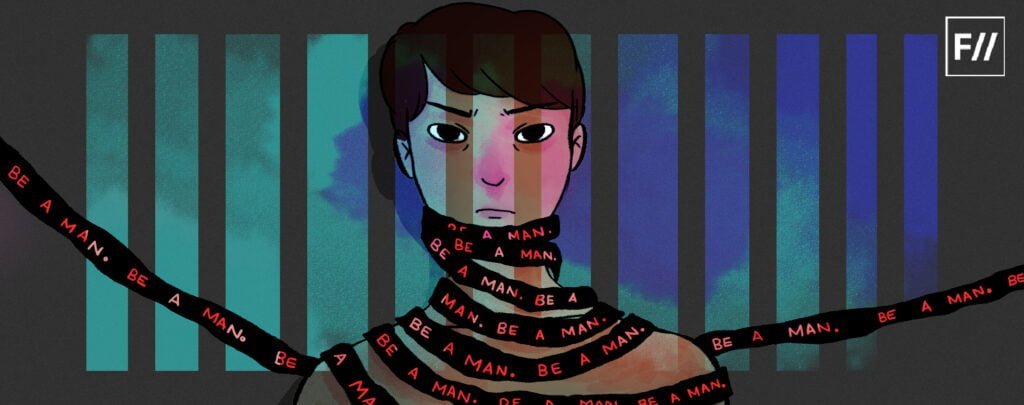It is a truth unanimously acknowledged by most women that a group of cis-men with microphones in a soundproof room have the power to create the most obnoxious and misogynistic podcasts while branding themselves with epithets from the Greek alphabet. These Andrew Tates and Joe Rogans have revived a certain brand of toxic masculinity that feminists had hoped would be on its deathbed by 2023.
These podcasters demand women be submissive and subservient, wistfully reminiscing the silent tradwives of the “good old 50s,” who pushed out multiple children and baked a mean pumpkin pie with equal gusto and finesse while the men were go-getters and providers, achieving career milestones at work and abusing their wives at home- the epitome of what Tate calls a ‘high-value man.’
As usual, things that are too lucrative to be outright rejected are often “reclaimed,” by the oppressed. A cult of supposed digital feminists, equipped with the language of the ubiquitous male podcasters who spew sexism and stock market stats in the same breath, has lately risen to prominence and attempted to reclaim the concept of the “high-value alpha.” These women digital creators are of the opinion that women ‘need to stop being lazy and pathetic,’ in order to ‘receive princess treatment,’ and ‘create their dream reality.’

While these creators share some impactful feminist content telling viewers to stop settling for less, establish boundaries, go to therapy and ‘take their power back,’ because women are powerful “queens,” some of their content urges viewers to be ‘selfish,’ and ‘stop dating broke guys.’
A cult of supposed digital feminists, equipped with the language of the ubiquitous male podcasters who spew sexism and stock market stats in the same breath, has lately risen to prominence and attempted to reclaim the concept of the “high-value alpha.” These women digital creators are of the opinion that women ‘need to stop being lazy and pathetic,’ in order to ‘receive princess treatment,’ and ‘create their dream reality.’
A lot of the content by these ‘feminist,’ podcasters and creators talks about becoming an aspirational version of oneself who is rich, beautiful, powerful and whom everybody is obsessed with. Needless to say, such unachievable aspirations and goals are what keep neoliberalism alive and well.
Thewizardliz and the cult of girlboss feminism
One of these female creators goes by the name of The Wizard Liz and is extremely popular among young women who are the most avid consumers of her content. Liz whose real name is Lize Dzjabrailova is a Belgian YouTuber of Chechen origin who creates motivational content for women, helping them be confident “high-value,” women.
Liz sports several characteristics that make her appealing to her viewers. She is young, beautiful, rich and an industry in herself. She has dealt with her demons through therapy and is healed and sorted. Young women in their early to mid-twenties, going through an uncertain phase in their lives, thrust into adulthood and neoliberalism, aspire to be like our 24-year-old podcaster who seems to have her life in order and so much going for her. From a thriving career as an influencer and seemingly perfect mental health to impeccable looks and people around her who willingly give her ‘princess treatment,’ all is booming with this podcaster.
For her young, impressionable twenty-something viewers who are still figuring life out, Liz is the aspiration itself, the powerful and confident version of them that has it all. Nobody knows this more than Liz who markets herself and her life by saying and implying that if Liz can have it all, why can’t every girl?
As a young and insecure twenty-something going through a crippling quarter-life existential crisis, I too, had found Liz at a point of time when I needed to hear what she had to say. During COVID, when my self-esteem was at an all-time low, Liz and her constant reassurances of how I could also be exactly like her helped me to push myself, seek therapy and become a better version of myself.
I got in shape, studied hard to get into the top percentile of my class and had what people around me called a “massive glow-up”. Women around me would marvel at my post-COVID transformation and I would always advise them to check out Liz’s content and work on themselves, marketing myself as an aspiration, just like Liz does.

It was not until I was at the end of my graduation, struggling to enter, assimilate in and adjust to the “real world,” with a slower metabolism, a stressed mind and a changing body, that I understood that Liz’s advice was not a one size fits all formula.
Her constant urges to her viewers to become Pinterest’s version of “that girl,” is rooted in privilege and perpetuates the neoliberal myth that we can all become as rich, successful and conventionally beautiful as her. Her content, although helpful at times, propagates a toxic girlboss feminism overall which assumes that everybody has the privilege to be perfect.
Do women really want to be spoiled by men?
One of the biggest contentions feminists might have with Liz is her constant need to be “spoilt by men,” in a relationship. She has a video on how to get the princess treatment in a relationship and be spoilt by a man. In this video, Liz suggests setting high standards and expectations for potential partners.
Said partners, according to Liz, must not be broke and must have a ‘provider mindset.’ Liz wants her female viewers to ‘demand,’ princess treatment and show the man that she deserves and is worthy of being spoiled with gifts and affection.
Women must ‘act like they need their partners,’ and ‘make him do things for her,’ and give her money. In this video, Liz radically redefines the trope and concept of the gold-digger, claiming that it is in fact, “feminist” to ask men to provide and spoil because women are worth a lot and the system is skewed against them.
Here, she refers to several real-world problems like the gender wage gap, but instead of campaigning for policy and systemic change, she advises viewers to manipulate the patriarchy to do their bidding.
Keeping the feminist politics of a man providing for a woman aside, it is important to note that the very concept of having a man spoil their female partner is ensconced in pretty privilege. A conventionally attractive woman like Liz will have a far easier time manipulating the patriarchy by using it to work in her favour. The very idea of pretty women getting free drinks at the bar or favours from interested men is a manifestation of patriarchy which privileges a certain standard of beauty while oppressing all women equally.
While some feminists would argue that pretty privilege is not real and is a misogynistic myth perpetuated by “jealous women,” to create strife in feminist solidarity, it is indeed true that while all women are equally oppressed by the patriarchy, some women are oppressed differently than others. Long story short, a woman who looks like Liz would find it a lot easier to get a provider partner who is willing to spoil her and give her ‘princess treatment.’

Moreover, the post-feminist notion of rejecting the 50-50 lifestyle model and asking a man to provide for you, is exactly what misogynistic male podcasters like Andrew Tate have been saying and promoting, albeit in a different manner.
While it is true that a woman works twice as a man since she has a job and also has to look after the home, and that systemic inequalities make it difficult for women to earn more, having a man provide for you entirely, robs you of financial independence and agency. Being provided for is all good until the relationship turns violent and leaving the toxic and abusive situation is not a financially viable option that a woman can afford.
Although in the video, Liz adds a disclaimer in the comments advising women to ‘never completely rely on a man for money,’ urging them to be ‘independent but spoiled‘, young, impressionable viewers might find it hard to draw a boundary like that when the entire video promoted the concept of traditional gender roles dressed up in a seemingly feminist garb.
While it is important for feminists to reclaim the medium of motivational videos or podcasts to educate and empower other women, it must be done in a sensitive and nuanced manner, keeping in mind the systemic inequalities and the intersectional identities of diverse women.
It is imperative to note that the girlboss mindset is not feminist. Rather, it promotes an aspirational lifestyle and perpetuates neoliberal delusions. Only by talking about and addressing the patriarchy that oppressed us all, albeit in different ways, can women rise and rise to realise their true self-worth.
About the author(s)
Ananya Ray has completed her Masters in English from Jadavpur University, Kolkata, India. A published poet, intersectional activist and academic author, she has a keen interest in gender, politics and Postcolonialism.






